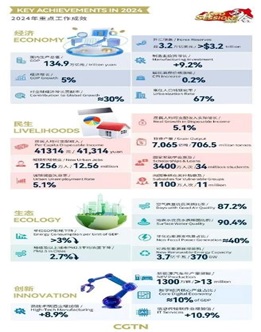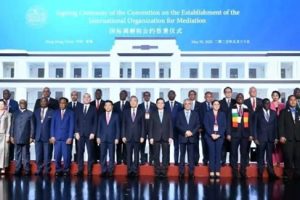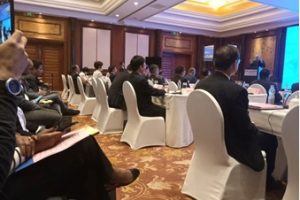
There is no denying the fact that China has positioned itself as a global leader in innovation and technological advancement. More to the point, with a strategic emphasis on developing its scientific and technological capabilities, the country has initiated a broad range of initiatives geared towards bolstering its economic framework and augmenting its industrial competitiveness.
The recent report on the work of the government delivered at the Third Session of the 14th National People’s Congress of the People’s Republic of China underscores China’s rapid development across various sectors. The report communicated its message in the following ways.
To boost China’s strength in science and technology, we rolled out major national science and technology programs across the board, worked faster to improve major science and technology infrastructure, and redoubled efforts to cultivate first-class innovators.
The report continued by stating that we ensured stable performance in the industrial sector and advanced technological transformation and upgrading in the manufacturing sector, which saw a 9.2-percent increase in investment. We fostered a new batch of national-level advanced manufacturing clusters and achieved rapid growth in emerging industries, including commercial space, applications of the BeiDou Navigation Satellite System, and new types of energy storage.
Mandatory national standards such as those for environmental protection and safety were formulated or revised. Thanks to swift development of the Digital China Initiative, the value added of core industries of the digital economy rose to about 10 percent of GDP.
We rolled out a five-year action plan for implementing the new urbanization strategy and made solid progress in urban renewal, while the share of permanent urban residents in the total population climbed to 67 percent. We continued efforts to consolidate the foundations of agriculture and steadily built up the agricultural sector’s capacity for disaster prevention and mitigation and overall production. New achievements were made in advancing all-around rural revitalization.
We secured further headway in promoting integrated regional development by introducing a range of regional development policies, implementing a set of major regional programs, and improving functional zoning systems and policies.
We adopted new policy measures to promote high-quality and full employment, supported businesses in creating new jobs, and ensured stable employment among key groups, including college graduates, people lifted out of poverty, and rural migrant workers.
We worked to build a strong educational system for China. Living allowances were increased for students with financial difficulties in the compulsory education stage. We increased the standards and expanded the coverage of government scholarships and grants. The cap on government-subsidized student loans was raised and the interest rates were lowered. Students across the country benefited from these measures over 34 million times.
We consolidated the gains of initiatives launched to relieve students of excessive burdens from homework and off-campus tutoring, bringing about a further improvement in the basic education environment. We made continued progress in advancing mutual recognition of clinical test results from different medical institutions and permitted community clinics to prescribe a wider range of medicines for chronic and common diseases. We took concrete steps to prevent and control key infectious diseases. Under the basic medical insurance scheme, urban workers were granted greater scope to use personal accounts for family members. Basic old-age benefits for rural and non-working urban residents and basic pension benefits for retirees were increased.
We deepened the reform of elderly care services and formulated policies to promote the development of the silver economy. We strengthened safe guards for the rights and interests of people with disabilities and increased subsidies for entitled groups. We improved the mechanism to set and adjust subsistence allowance standards and expanded the coverage of this program.
We refined the measures for national public holidays and memorial days. Cultural programs and industries were boosted and cultural and tourism markets continued to thrive. We made good preparations for the 9th Asian Winter Games and successfully hosted the 12th National Traditional Games of Ethnic Minorities of the People’s Republic of China. Chinese athletes achieved their best overseas Olympic performance at the Paris Olympics.
We stepped up comprehensive efforts to improve the environment and achieved yet another drop in the discharge of major pollutants. We implemented major projects for protecting and restoring key ecosystems and realized a further reduction in the areas of both deserts and sandy lands. We pushed ahead with upgrading in key industries for energy conservation and carbon reduction and advanced the development and use of new energy sources.
The share of electricity generated from non-fossil fuels increased, accounting for close to 40 percent of total power generation. We launched the National Voluntary Greenhouse Gas Emission Reduction Trading Market, and carbon emissions trading in China became increasingly brisk.
We implemented the Party Central Committee’s strategic plans for conducting full and rigorous Party self-governance, strictly complied with the central Party leadership’s eight-point decision on improving work conduct, and launched an initiative to increase awareness of Party discipline. We made a major push to address pointless formalities so as to lighten the burdens on those working on the ground, intensified efforts to rectify misconduct directly affecting people’s lives, and kept working to improve conduct, build integrity, and combat corruption.
We advanced law-based government administration. We submitted 19 legislative proposals to the Standing Committee of the NPC for deliberation and formulated or revised 28 administrative regulations. We readily accepted oversight in compliance with the law and handled with keen attention recommendations from NPC deputies and proposals by CPPCC National Committee members. We stepped up supervision over administrative law enforcement and regulated administrative inspections on enterprises.
We rolled out two lists of major matters covered by one-stop government services and boosted our overall ability to provide online and offline services. General inspections were launched to assess progress toward high-quality development. We developed new and better ways of conducting social governance. We redoubled efforts to identify and defuse conflicts and disputes and put the handling of public complaints on a solid legal footing.
We improved emergency management and workplace safety and adopted whole-of-chain approaches to tackling safety hazards such as those related to gas and electric bikes. We took effective measures to guard against and respond to floods, typhoons, earthquakes, and other natural disasters. We improved the national security system, adopted rigorous measures to prevent the occurrence of critical incidents and cases, and cracked down hard on major crimes in accordance with the law. In doing so, we protected our people’s lives and property and ensured social stability.
In 2024, we made new advances in conducting major-country diplomacy with Chinese characteristics. President Xi Jinping and other Party and state leaders visited many countries and attended major bilateral and multilateral events, including the Astana Summit of the Shanghai Cooperation Organization, the 16th BRICS Summit, the 31st APEC Economic Leaders’ Meeting, the 19th G20 Summit, and the leaders’ meetings on East Asian cooperation.
China also hosted several major diplomatic events at home, such as the Beijing Summit of the Forum on China-Africa Cooperation, the Conference Marking the 70th Anniversary of the Five Principles of Peaceful Coexistence, and the10th Ministerial Conference of the China-Arab States Cooperation Forum.
We continued to promote the building of a community with a shared future for mankind. We consolidated and expanded partnerships across the globe, stayed committed to true multilateralism, and played a positive and constructive role in addressing global challenges and resolving regional and international hotspot issues. With these efforts, China made important contributions to peace and development in the world.
We owe our achievements in 2024 to General Secretary Xi Jinping, who is at the helm charting the course, and to the sound guidance of Xi Jinping Thought on Socialism with Chinese Characteristics for a New Era. We also owe them to the strong leadership of the Party Central Committee with Comrade Xi Jinping at its core, and to the concerted efforts of the whole Party, the armed forces, and the Chinese people of all ethnic groups.
Internationally, changes unseen in a century are unfolding across the world at a faster pace. An increasingly complex and severe external environment may exert a greater impact on China in areas such as trade, science, and technology. Global economic growth lacks steam, unilateralism and protectionism are on the rise, the multilateral trading system is experiencing disruptions, and tariff barriers continue to increase. All this is undermining the stability of global industrial and supply chains and impeding flows in the international economy.
The factors causing geopolitical tensions remain numerous, and they are affecting global market expectations and investment confidence and fueling the risk of volatility in global markets.
BY ADDISALEM MULAT
THE ETHIOPIAN HERALD SUNDAY EDITION 9 MARCH 2025



